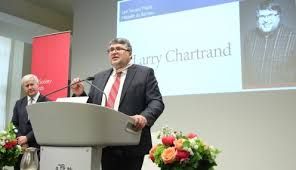
If you ask Larry Chartrand, LLM’01, why and how he became a lawyer, he will tell you it was a serendipitous “accident.” That it was.
However, it was no accident that the Law Society of Upper Canada (LSUC) included Chartrand among the seven exceptional members of the legal profession who received a 2017 Law Society Medal. The honour celebrates outstanding service within the legal profession.
Chartrand, who teaches in the Common Law section of the University of Ottawa’s law school, is renowned as a leader and an innovator in the study of Aboriginal and Métis law and as one of Canada’s foremost legal scholars on Métis constitutional rights. “Professor Chartrand has dedicated his career to developing educational initiatives, law and policy that have significant impact on recognition and respect for Indigenous rights and access to justice. He has challenged Canada’s academic and governmental institutions to be more inclusive,” his medal citation states.
Northern Alberta-born and of Métis heritage, Chartrand grew up dreaming of being a teacher. He earned his BEd degree from the University of Alberta in 1989, but when a friend who hoped to attend law school asked him to be her LSAT study partner, Chartrand found his true calling. “That’s how I fell into the law accidentally,” he recalls with a laugh.
After earning his LLB at Osgoode Hall law school in 1989 and working briefly on Bay Street, Chartrand returned home to serve as Director of the Indigenous Law Program at the University Alberta. In 1994, he began teaching at the University of Ottawa. He has been there ever since, while concurrently serving a three-year term (2004–07) as Director of the Aboriginal Self-Government program at the University of Winnipeg.
Chartrand enrolled in graduate studies at Queen’s Law in 2000 in order to formalize his advanced academic credentials. It was his student experiences studying under (then-professor) Dean Bill Flanagan – for whom he wrote a master’s thesis on the political dimensions of Aboriginal rights – that proved pivotal in his legal career. “Writing that paper opened my eyes to the possible new directions I could take,” Chartrand recalls. “I developed a critical approach to the law that has helped me to understand how challenging the fields of Aboriginal and Métis law can be.”
In particular, he came to recognize an inherent racism in the legal system that creates tensions between Crown rights and those of Canada’s Aboriginal and Métis peoples. It is his desire to correct that situation that drives him. As Chartrand noted in his comments at the May 24 ceremony, where he received his LSUC medal, “Law has the capacity to be a powerful and positive agent of change where we’re fully aware of its flaws and weaknesses.”
By Ken Cuthbertson